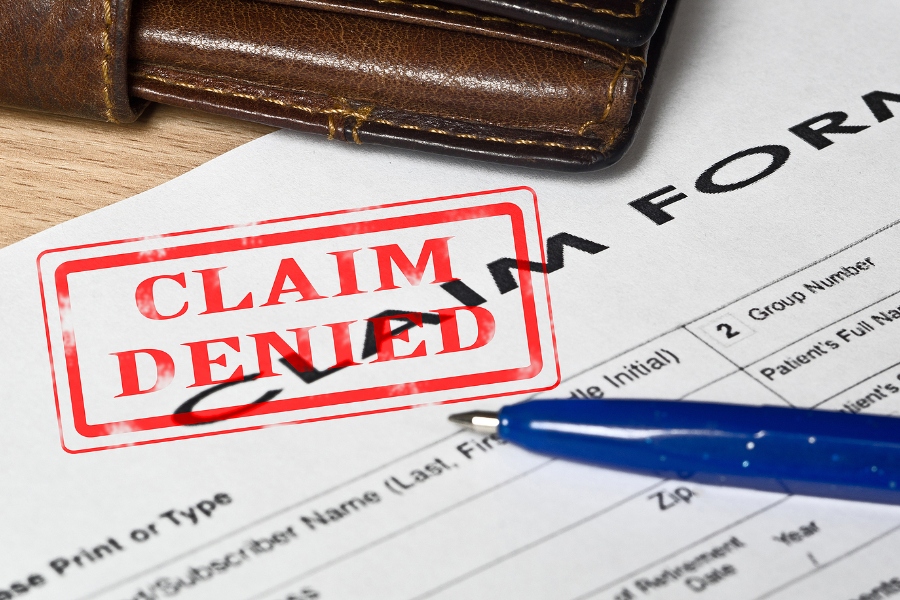Summary:
- Insurance companies deny claims regularly, causing frustration and confusion.
- Some reasons for denials include policy limitations, claim filing errors, disputes over fault, and others.
- Speaking with a personal injury attorney is one of the most critical steps after an insurance claim is denied.
Was your insurance claim denied? If so, you’re probably frustrated and confused. You did all of the right things and complied with the terms of your policy. But the insurer rejected your claim anyway. What can you do to fight for your rights?
You can turn to The Eberst Law Firm. Our team of attorneys will investigate to determine the reason for the denial and fight to help you get the money you deserve. Call 772-225-5566 or contact us online to schedule a free consultation.
The following is a look at some common reasons for insurance claim denials. You’ll also learn the steps to take after a denial. Understanding your options and taking action can ensure the insurance company treats you fairly.
Common Reasons for Insurance Claim Denials
Getting an “insurance claim denied” message can be infuriating, especially since car insurance is so expensive in Florida. In 2023, minimum automobile coverage cost an average of $1,343 per driver yearly. That’s more than double the national average.
Homeowners have to deal with denials far too often, as well. Insurers denied or delayed nearly 40% of property damage claims stemming from Hurricane Ian.
Why was your insurance claim denied? These are a few of the possible reasons.
Policy Coverage Limitations
Insurance policies come with specific terms and conditions, and sometimes claim denials stem from policy coverage limitations. Before filing a claim, you must thoroughly understand your policy, including any exclusions or limitations. For example, insurers might not cover certain events or damages. The insurer could deny your claim if you don’t know your policy’s limitations.
Errors in Claim Filing
Simple errors in the claim filing process can lead to denials. It’s essential you provide accurate and complete information when submitting a claim. Any discrepancies, missing documents, or inaccuracies in the information you supply can give the insurance company the excuse it needs to deny your claim.
Double-checking all details and including all required documentation can help you avoid this common pitfall.
Disputes Over Fault or Liability
Insurance claims often involve determining fault or liability, especially when accidents lead to injuries. If there is a dispute over who is at fault, the insurance company may deny the claim. That’s why providing clear, compelling evidence is critical. Solid proof will help support your version of events and prevent denial.
Not Seeking Immediate Treatment
If you suffer an injury in an accident and fail to see a doctor, that could lead to a claim denial. Your insurer will argue that your injuries weren’t severe or directly related to the incident. It’s essential to prioritize your health and well-being by seeking prompt medical treatment. Doing so isn’t only crucial for your health. It’s also crucial for your claim.
Steps to Take After a Denial
Thankfully, you don’t have to accept an insurance claim being denied. You can fight to protect your rights and get every dollar you have coming. These are just a few ways you can do precisely that.
Consult a Personal Injury Attorney
If the insurer denied your claim, the first thing you need to do is to speak with a personal injury lawyer. An experienced attorney can review the details of your case, assess the grounds for denial, and guide you on the best course of action.
Attorneys provide valuable expertise in dealing with insurance companies and can help you deal with all the complications associated with the claims process.
Review the Denial Letter
The best way to formulate an effective response is to understand the reasons for the denial. Your denial letter should spell out those reasons. When you appeal the insurer’s decision, you and your attorney will work together to address their objections. Also, you need to gather any documentation or provide any information required for a successful appeal.
Gather Additional Evidence
To strengthen your case during the appeal process, gather additional evidence that supports your claim. This could include medical records, eyewitness statements, photographs, or other relevant proof. Presenting a comprehensive and well-documented case increases the likelihood of winning your appeal.
Appeal the Decision
Insurance companies often provide a window for appeals after a claim denial. Take advantage of this opportunity by submitting a formal appeal, addressing the issues outlined in the denial letter.
Ensure that your appeal is well-organized and includes all necessary documents. You’ll have to provide a clear and compelling argument for the insurer to reconsider your claim.
Contact The Eberst Law Firm to Speak with an Experienced Personal Injury Attorney About Your Claim
The Eberst Law Firm is here to help if your insurance claim is denied. Our experienced personal injury attorneys know how to deal with insurers, and we’re passionate about helping our clients obtain every bit of compensation they deserve.
Contact us today for a consultation to discuss your case and explore the best strategies for moving forward. You can use our online form or call 772-225-5566.
Frequently Asked Questions
How long do I have to appeal an insurance claim denial in Florida?
In Florida, the timeframe for appealing an insurance claim denial can vary depending on the type of insurance and the specific policy. You’ll need to refer to your insurance policy for the specific deadline for filing an appeal. You may have 60 days or more, but you should act promptly to meet any applicable deadlines.
Can I file a lawsuit if my insurance claim is denied?
There’s a chance your insurer is acting in bad faith and denying your claim unfairly. Florida law allows you to file a lawsuit against an insurance company if it should have approved the claim.
What should I do if I suspect my claim was unfairly denied?
Taking proactive steps to address the situation is essential. Begin by carefully reviewing the denial letter to understand the reasons provided by the insurance company. Consult with a personal injury attorney to discuss the details of your case and determine the best course of action.

